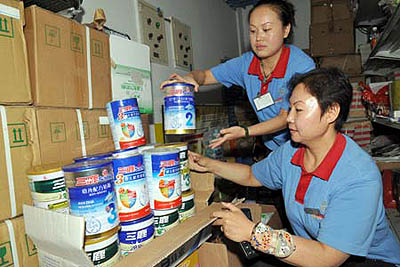|

Saleswomen check the returned Sanlu brand milk powders in a supermarket in Yinchuan, capital of northwest China's Ningxia Hui Autonomous Region Sept. 17, 2008. (Xinhua)
The contaminated milk powder scandal in China triggered removals of company executives and negligent officials, arrests of suspects and put 22 melamine-tainted dairy producers under fire.
What's truly applauded by consumers, however, is the quality watchdog's late Wednesday announcement that it would remove all inspection exemptions formerly granted to food producers.
This is a positive step forward in China's uphill battle for food safety, but only if all quality checks are carried out in a strict, open and impartial manner.
Food safety should be the last category exempt from checkups.
The General Administration of Quality Supervision, Inspection and Quarantine has used the exemption as a special reward since 2000. Chinese companies with a reputation of quality products, big market shares and strict safety controls didn't have to undergo certain inspections.
Immunity has indeed helped nurture some domestic brands, but the honor roll became a blacklist when a number of companies became involved in food safety scandals.
The latest involves Sanlu Group, Mengniu, Yili and Yashili, among other well-known dairy producers. In the past, most of these companies have been exempt from food quality checks. Instead they had been crowned "domestic name brands" and were expected to bolster national pride in the dairy industry, as China, a traditional tea-drinking nation, plays a lesser role in the international market.
Melamine-contaminated Sanlu milk powder had by Wednesday sickened more than 6,200 babies across China and caused four deaths. The hard lesson we should learn from this tragedy: never overestimate the credibility of any company, or any product.
Take Sanlu for example. The company, based in Shijiazhuang, was fully aware of the contamination but kept the fact from the public.
The dairy giant received a consumer's complaint at least three months ago about children getting sick from its product. Instead of tracing its own problems, the company reportedly bribed the consumer into deleting his online posts with more than 2,000 yuan (286 U.S. dollars) worth of milk products.
Infant kidney stone cases cropped up in several provinces. Domestic media reported the babies drank "the same brand of milk powder," but no brand name was given.
In early September, a newspaper in northwestern Gansu Province pointed a finger to Sanlu for the first time. Sanlu still insisted its products were safe.
The company's confession that its formula wasn't safe appeared after an internal investigation which lasted only one day. By then, at least 700 tons of the problematic product was still on sale.
Sanlu Group blamed illegal dairy dealers for adding melamine to milk, as if the company itself had nothing to do with the scandal.
By shunning responsibility, Sanlu is trying to convince the public that it simply buys milk from contracted dealers -- regardless of what is in it, puts the milk on production lines and then packs up tons and tons of product for unsuspecting consumers.
This is not the message Sanlu conveyed this time last year.
On nationwide TV, Sanlu ran a series of commercials about how good its milk powder was and how the company's quality tests were strict.
All Sanlu products underwent complicated testing procedures involving 1,100 steps, the commercial stated. But how many steps does it take to detect melamine?
Sanlu was reportedly one of the blacklisted producers in a shoddy low-protein infant milk powder scandal four years ago. Backthen, 13 infants died and 171 were hospitalized.
Few people traced how the company made it off that list. Perhaps many believed a smaller company produced the bad milk powder but used Sanlu's name. Perhaps we were all too apathetic.
Some say the dairy scandal could be a blessing in disguise. At least the problem is now on the table which is the first step to solving it.
The quality watchdog's decision to remove all exemption qualifications for food producers, is at least a positive move to sweep away the "blind areas" in food safety.
As a mother, I would like every party involved to shoulder their responsibilities as China works to improve its system.
Businesses should adopt stricter quality controls. Governments, at all levels, should exercise more supervision. Media should point its finger when the facts are there.
Only when those objectives are met can Chinese stop wondering what to put on dinner tables or in their babies' bellies. Only then can Chinese businesses feel confident in the face of their international competitors.
(Xinhua News Agency September 18, 2008) | 